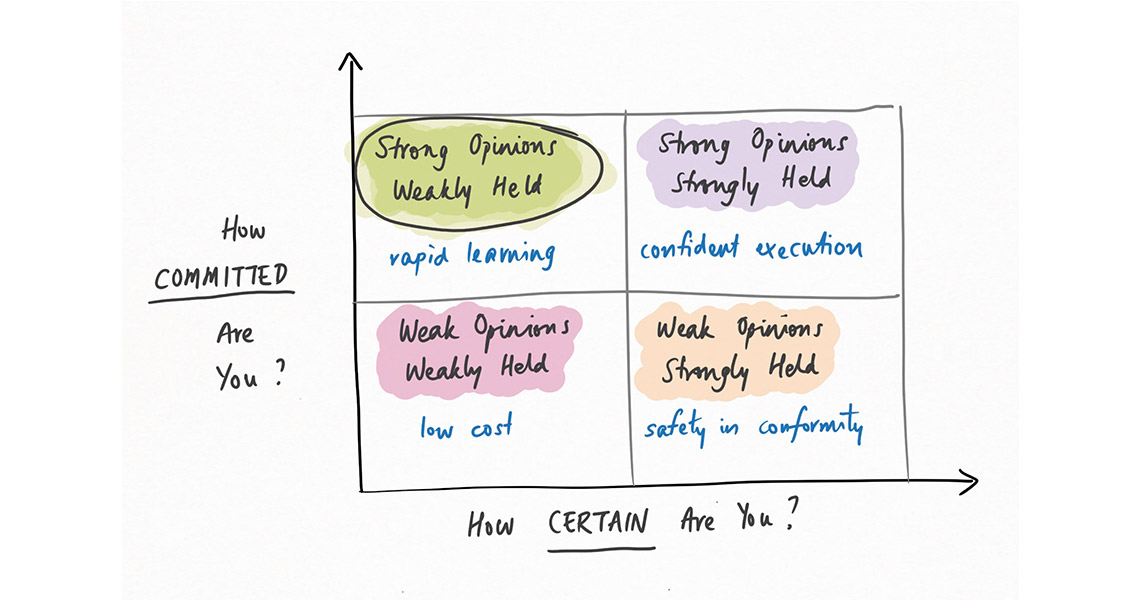Or, decision-making under incomplete information.
By Abraham Thomas | 06 July 2024

For many years, Marc Andreessen’s Twitter bio read: ‘Strong Opinions, Weakly Held (SOWH)’. What do these words mean? I’ve heard quite a few explanations, and they all seem to miss the point.
Imagine you’re lost in the countryside, and you come to an unmarked fork in the road. You have no idea which direction leads to the nearest village, but night is falling, and you must choose. What do you do?
The absolute worst thing you can do is stay put. Without the data to make an informed choice, you make no choice at all, and are paralyzed. This is a bad idea, and everybody agrees that it’s a bad idea, from Aristotle onwards.
So you pick a direction at random, and off you go. But here’s the subtle trap. Because you worry that your choice is incorrect, you go slowly.
This is the second worst thing you can do. Your lack of certainty has led to a lack of commitment. A slow pace may be psychologically comforting, but as a method of getting un-lost, it’s terrible.
Part one of Andreessen’s aphorism addresses this: strong opinions. If you’re going to do something, do it at full throttle. Night is falling; get to the village as quickly as you can. But if you find that the road you’re on dwindles into nothingness, don’t be stubborn about it; turn around! This is the second part of the aphorism: weakly held.
The beauty of this combination is that it maximises the rate of learning. The faster you go down a path (strong opinions), the sooner you’ll know whether you need to reverse direction (weakly held).
SOWH is a phenomenal learning tool, and not just for lost travellers.
Most people utterly fail at this combination. They don’t truly commit to the path they’re on — they don’t give it all they’ve got — but at the same time, they’re unwilling to change their direction. Having made a choice — even if the choice was made on limited or outdated information — they feel they have to stick to it.
Let's dig a bit deeper. When does SOWH work, and when does it fail? One way to answer this is with a classic consultant's 2x2.
There are 4 possible combinations of commitment and certainty:
Strong opinions strongly held is the realm of determinism. You know what you need to do, now go and do it. If you’re in a well-defined and well-understood problem space, this can be a great strategy.
Weak opinions weakly held is the path of least resistance. You don’t commit deeply, and you don’t mind changing directions. This strategy doesn’t necessarily lead to forward progress, but it’s low-cost and inoffensive.
Weak opinions strongly held is surprising. You’d think this quadrant would be empty: after all, who in their right mind would be stubborn and didactic about something they have no information about? The answer is, quite a lot of people. This is fundamentally a static and safe choice: never change your mind, and never push hard enough that your mind needs changing.
Strong opinions weakly held is the true empty quadrant. People don’t like to admit ignorance, and they don’t like to appear changeable. (Understandably so; many organisational cultures penalise them for those attributes.) And yet it’s the optimal strategy if what you care about is the rate of learning.
SOWH is a technique for decision-making under imperfect information.
This is not quite the same as decision-making under uncertainty. The premise of SOWH is that information exists — information that can be used to mitigate the uncertainty — but you don’t have it yet. SOWH is a way of acquiring that information as efficiently as possible.
I’ve found myself using variants of SOWH all through my career: as a trader at a hedge fund, then as a startup founder, and now as an angel investor. All three professions require(d) me to place bets without knowing all the facts; in all three professions, I was rewarded for rethinking those bets when new facts came to light. But I didn’t have a formal way of defining this approach until I came across Andreessen’s aphorism.
Strong Opinions, Weakly Held is now my mantra. May it soon be yours as well!